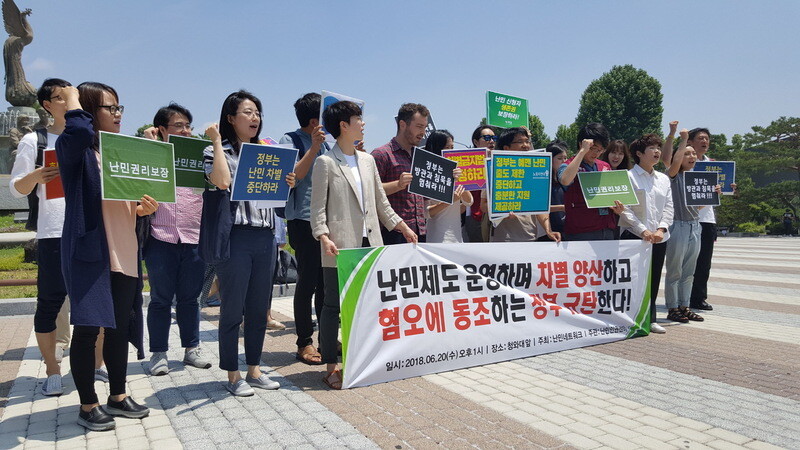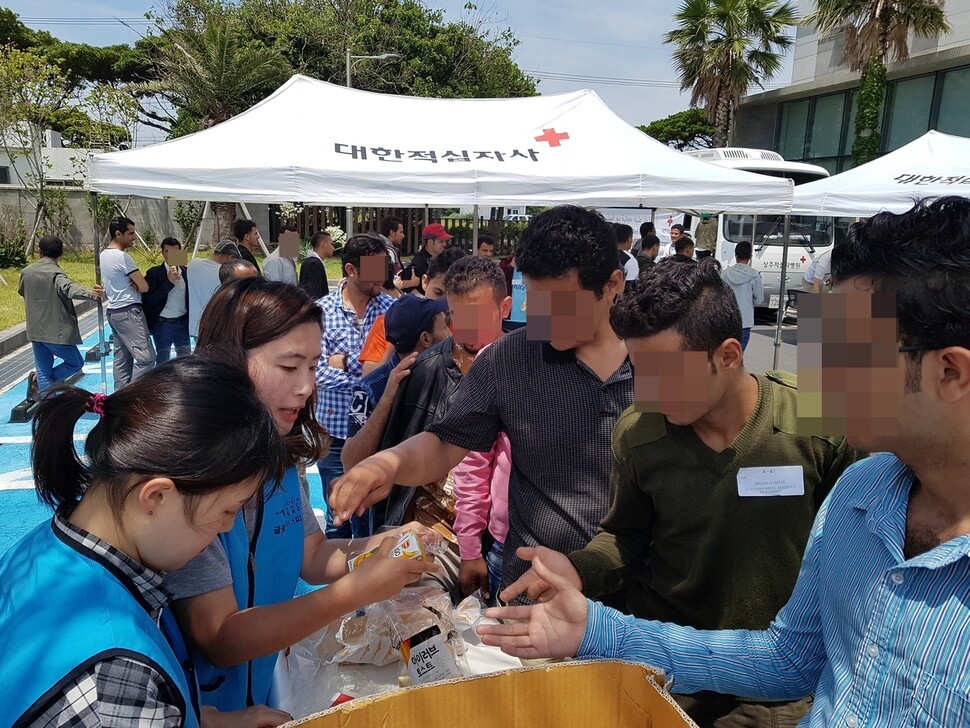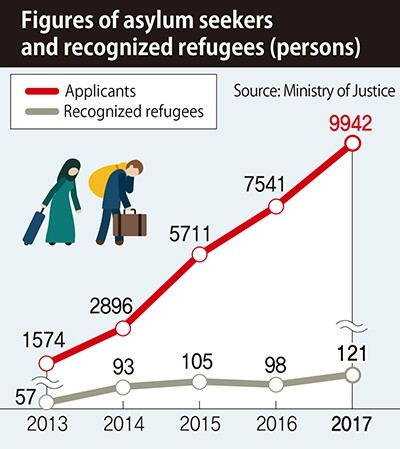hankyoreh
Links to other country sites 다른 나라 사이트 링크
Prejudice and lack of policy leave Yemeni refugee applicants in stateless limbo

On June 19, one of the students in a Kakao Talk group for freshmen at a high school in central Jeju City spread a rumor that Yemenis “attack any women walking near city hall.”
“OMG, really?” read one reply. “That’s scary,” another student wrote. “My mom tells me not to go around alone at night,” wrote a third.
The group was far from the only example of hatred and fear of refugees. In the five-day period after news of the Yemeni refugee issue first gained attention on June 15, around 80 messages opposing or expressing concerns about refugees were posted in a Jeju mothers’ café with over 86,000 members. On the Jeju Provincial Office website, around 40 messages objecting to the refugees’ presence were posted in the space of one day on June 19.
While critics have generally attacked the government’s “absurdly generous” policies toward refugees, the reality has been the opposite. Since restriction on mainland travel by Yemenis in Jeju was imposed on Apr. 30, only five have traveled to other parts of South Korea. Four of them were members of a single family with two children; one was a pregnant woman sent to the Seoul area (including the capital and surrounding Gyeonggi Province) for necessary medical treatment. A look at previous examples of people who have applied for refugee status in South Korea is enough to predict what kind of life awaits them on the mainland.
Once an application for refugee status has been submitted in South Korea, the results typically take three to five years. South Korea’s refugee recognition rate of 4.1 percent is already substantially lower than the 38 percent average for the rest of the world. But according to many experts, the actual rate is closer to around 3 percent when the high rate of applicants who “withdraw or cancel” midway through the review process (11.1 percent) is taken into account. Many choose to leave South Korea during the interminable review period due to human rights violations or difficulties earning a living.
A former dancer in Cote d’Ivoire, 36-year-old Aman has remained an applicant for over 15 years since arriving in South Korea, having requested second and third hearings after a first application was rejected. Eight fellow dance troupe members who applied in Germany around the same time have all been granted status there. The review process is also still “pending” for another refugee named Matilda, who arrived in South Korea in 2012 after previously going from one refugee camp to another.

Victimized by unfair labor practices
A ban on employment for the first six months after applying leaves refugees facing dire poverty. A livelihood support system does exist, but a 2017 study by the Center for Refugee Rights in South Korea (NANCEN) found that only 436 of 13,294 refugee status applicants entitled to benefits were actually receiving livelihood support last year, or 3.2 percent. The average beneficiary was also found to have received around 400,000 won (US$360) for a period of three months and 10 days.
“People living in South Korea while undergoing refugee status reviews are not even subject to the terms of laws to protect migrant workers and inevitably end up victimized by unfair labor actions,” said Moon Gyeong-ran, chairperson of the Korea Human Rights Policy Institute and author of the book “The Refugees among Us.”
“They cannot even register births, with the result that statelessness is passed down to their children,” Moon added.
Lack of policies and staff

The reason South Korea’s refugee status review barrier is longer and taller than almost anywhere else has mainly to do with an absence of policies. Experts pointed in particular to a profound shortage of refugee review agencies and staff. The Korea Immigration Service (KIS), which is responsible for reviews, has a total of ten branches and 39 reviewers nationwide. As the Yemeni refugee issue surfaced, it emerged that reviews for over 500 refugees were being conducted by just two KIS reviewers.
“They’ve been talking about the refugee application backlog for over 20 years, but the government has focused not on increasing the related budget or infrastructure, but on weeding out applicants,” said Park Young-a, an attorney with the GongGam Human Rights Law Foundation.
Kim Yeon-ju, an attorney with NANCEN, noted the case of two Chinese Uyghurs who were denied entry after applying via Turkey in May for refugee status as members of an ethnic minority.
“During the same period, eleven Yemenis were returned to a second country because of doubts about their visit for ‘tourism purposes.’ We need to examine whether the South Korean government is forcibly repatriating refugees based on its own arbitrary interpretations,” Kim said.
A KIS official said the individuals in question were “individuals who, based on their appearance, could not have been refugees” and were “not repatriated, but denied entry,” but did not provide specifics on the grounds for the denial.
Life in Korea for refugees
Even if applicants survive 1-in-700+ odds and pass the review process, life in South Korea is not easy. Many refugees have cited the language barrier, the local hatred of outside cultures including Islamic ones, and racial discrimination as factors making South Korea a difficult place to live.
“One refugee applicant told me, ‘I’ve been hurt more since coming to South Korea than when I was politically persecuted in my homeland.‘ It really shows our society’s attitudes toward refugees,” said Yonsei University cultural anthropology professor Kim Hyun-mee.
Refugee rights groups stressed the need for improvements in the government’s refugee policies. While 9,942 refugee applications were filed in 2017, but the number of government employees handling reviews totals just 38 nationwide. According to data from NANCEN, a recent case was discovered of falsified questioning in a refugee interview; in another case, a refugee applicant who went to pick up a notification on the dismissal of an appeal was immediately taken into custody by a special migrant investigation team and transported to Incheon International Airport for deportation.
While South Korean law entitles refugee applications to livelihood support, only a tiny minority of applicants actually receive benefits. According to NANCEN, livelihood support was provided to just 3.2 percent of all refugee applicants as of Dec. 31, 2017. NANCEN argued that the reason has to do with a lack of budget and the Ministry of Justice failure to adequately publicize its livelihood support system.
“We do have a Refugee Act. What we don’t have any real government-level control tower for refugee support,” said Lee Seul, an activist with NANCEN.
“The related offices need to cooperate on filling the gaps in policy,” Lee stressed.
By Huh Ho-joon, Jeju correspondent, and Nam Eun-joo and Jung Hwan-bong, staff reporters
Please direct comments or questions to [english@hani.co.kr]

Editorial・opinion
![[Editorial] Intensifying US-China rivalry means Seoul must address uncertainty with Beijing sooner than later [Editorial] Intensifying US-China rivalry means Seoul must address uncertainty with Beijing sooner than later](https://flexible.img.hani.co.kr/flexible/normal/500/300/imgdb/original/2024/0517/8117159322045222.jpg) [Editorial] Intensifying US-China rivalry means Seoul must address uncertainty with Beijing sooner than later
[Editorial] Intensifying US-China rivalry means Seoul must address uncertainty with Beijing sooner than later![[Column] When ‘fairness’ means hate and violence [Column] When ‘fairness’ means hate and violence](https://flexible.img.hani.co.kr/flexible/normal/500/300/imgdb/original/2024/0516/7417158465908824.jpg) [Column] When ‘fairness’ means hate and violence
[Column] When ‘fairness’ means hate and violence- [Editorial] Yoon must stop abusing authority to shield himself from investigation
- [Column] US troop withdrawal from Korea could be the Acheson Line all over
- [Column] How to win back readers who’ve turned to YouTube for news
- [Column] Welcome to the president’s pity party
- [Editorial] Korea must respond firmly to Japan’s attempt to usurp Line
- [Editorial] Transfers of prosecutors investigating Korea’s first lady send chilling message
- [Column] Will Seoul’s ties with Moscow really recover on their own?
- [Column] Samsung’s ‘lost decade’ and Lee Jae-yong’s mismatched chopsticks
Most viewed articles
- 1For new generation of Chinese artists, discontent is disobedience
- 2[Column] US troop withdrawal from Korea could be the Acheson Line all over
- 3[Editorial] Transfers of prosecutors investigating Korea’s first lady send chilling message
- 4[Exclusive] Unearthed memo suggests Gwangju Uprising missing may have been cremated
- 5[Editorial] Intensifying US-China rivalry means Seoul must address uncertainty with Beijing sooner t
- 6Xi, Putin ‘oppose acts of military intimidation’ against N. Korea by US in joint statement
- 7China calls US tariffs ‘madness,’ warns of full-on trade conflict
- 8Could Korea’s Naver lose control of Line to Japan?
- 9China, Russia put foot down on US moves in Asia, ratchet up solidarity with N. Korea
- 10For Korea’s Justice Ministry, no place is sacred from immigration raids